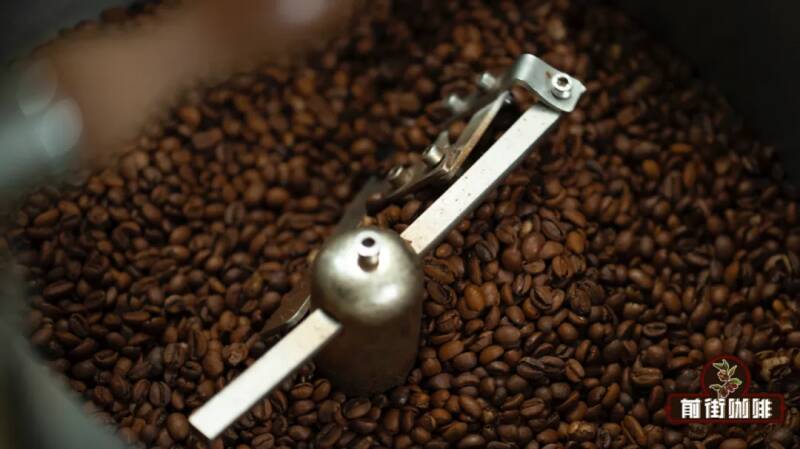Why does the coffee you drink taste sour? Why is coffee sour? What is the cause of caffeic acid?
In the article "Why most coffee is sour nowadays", Qianjie talked about why most coffee is sour and why it is sour. Then a lot of friends said: why should the coffee be sour? I understand, but the question comes again, why is the coffee sour?

The answer is simple, because coffee itself contains very rich sour substances. The reason why most people think that coffee is sour is a wonderful thing, which is largely due to the fact that before the millennium, the mainstream coffee was roasted deeply.
Deep roasting causes the sour substances contained in the coffee to decompose and then convert into other substances. Although not all, but the scorching taste of deep baking will also cover up the remaining sour taste, so in the past, people thought that coffee was bitter and acid-free.

With the advent of the boutique era, the baking degree of the mainstream has changed from deep to shallow. Without a long time of baking and no bitterness cover-up, people can feel the sour taste in the coffee. However, coffee is not as sour as possible.
Why isn't coffee as sour as possible?
Because the acid we want to feel in coffee is "acidity" rather than "acidity". The so-called acidity refers to the strength of acidity in a cup of coffee.
As we all know, there are four main flavors that we can feel from coffee: sour, sweet, bitter and salty. And all four of them check and balance each other! When one of the flavors is much higher than the others, the performance of the flavor in the coffee will become prominent and sharp and unacceptable.
Just like oranges and lemons, one tastes sweet and sour and the other tastes sour, which is due to the difference in acidity. Qianjie believes that few friends will directly enjoy lemons. So, coffee is not as sour as possible.
Acidity refers to the acidity that other senses experience in coffee in addition to the taste buds. Most of the flavor is associated with the acid after we feel it. Therefore, sour quality is the acid we want to feel in coffee.
But the acid quality is also good and bad! A good acid will have an obvious sense of sweetness, which can remind us of the rich fruit aroma, that is, a sweeter acid. For example, the lighter performance is citrus, carambola, pineapple. The deeper ones are black plum, purple grapes and ripe fruit. Anyway, it is the acid that reminds us of the positive flavor.
Bad acid will make us feel some unpleasant taste, for example, this sour taste will remind us of the sour taste of herbs, or the sour taste of some kind of vinegar, or a strong sour taste with a strong sense of astringency.
It is important to know that the degree of roasting is not entirely a factor that determines the acidity of coffee. Although roasting can control the taste of coffee, the lighter the roast, the more sour the coffee. But as mentioned in the previous article in the front street, the acid we pursue is acidity, not acidity. So the extent to which the coffee needs to be roasted mainly depends on the degree to which the beans are the most expressive.
The acidity we feel in coffee is mainly formed by the decomposition of various organic acids after baking. That is to say, the amount of organic acid in coffee beans determines the degree of coffee acidity. It's very roundabout, but that's the reason.
The content of organic acids in a coffee bean mainly depends on its altitude at the time of planting and the fertility of the soil, because these factors will play a positive role in the formation of organic matter in coffee beans. The higher the altitude, the more fertile the soil, the more organic acids in coffee beans can accumulate, and vice versa.
In front of the street, give a more intuitive chestnut for everyone to understand: if you roast coffee beans planted at an altitude of 1600 meters, it will show very solid and full fruit acidity; but if the coffee beans are planted at an altitude of 1000 meters above sea level, and then roasted lightly, the acidity it can show will be very hollow, there is no obvious fruit aroma, sweetness is not high, strong only nutty flavor. This is the gap caused by the planting environment.
Of course, this is not to say that the acidity of a cup of coffee is entirely borne by the environment when it is planted. The handling, roasting, and even brewing of coffee can affect the acidity of a cup of coffee. When there is a mistake in these "cooking" aspects of coffee, the acidity will develop in a negative direction, so that we can experience a bad negative flavor. Therefore, no matter which link it is, we'd better concentrate on it and avoid the occurrence of car rollover.
-END-
Important Notice :
前街咖啡 FrontStreet Coffee has moved to new addredd:
FrontStreet Coffee Address: 315,Donghua East Road,GuangZhou
Tel:020 38364473
- Prev

Drought and fires intensify in Brazil! Coffee bean production cycle forced to be delayed
According to local Brazilian media reports, fires have continued across Brazil since the end of August, further exacerbating the problems that have plagued the Brazilian coffee industry due to drought. Since coffee plantations in São Paulo state were swallowed by fire earlier and the coffee tree plants were destroyed, producers will have to replant new coffee trees, which will make
- Next

Do you have to charge twice for American milk with 50ml?! Ye Pi: It has been rectified
▲ Click to pay attention| Daily Boutique Coffee Culture Magazine Coffee Factory Recently, a post on social media about Piye's oatmeal milk charges aroused discussion among netizens. The poster said that when he drank hot American style, he had the habit of adding a little oatmeal milk to the American style, so he deliberately chose "Add oatmeal milk" when placing an order on the delivery platform
Related
- What grade does Jamaica Blue Mountain No. 1 coffee belong to and how to drink it better? What is the highest grade of Blue Mountain coffee for coffee aristocrats?
- What are the flavor characteristics of the world-famous coffee Blue Mountain No. 1 Golden Mantelin? What are the characteristics of deep-roasted bitter coffee?
- Can I make coffee a second time in an Italian hand-brewed mocha pot? Why can't coffee be brewed several times like tea leaves?
- Hand-brewed coffee flows with a knife and a tornado. How to brew it? What is the proportion of grinding water and water temperature divided into?
- What is the difference between Indonesian Sumatra Mantinin coffee and gold Mantinin? How to distinguish between real and fake golden Mantelin coffee?
- What does bypass mean in coffee? Why can hand-brewed coffee and water make it better?
- Unexpected! Ruixing Telunsu lattes use a smoothie machine to foam milk?!
- % Arabia's first store in Henan opens into the village?! Netizen: Thought it was P's
- Does an authentic standard mocha coffee recipe use chocolate sauce or powder? Mocha Latte/Dirty Coffee/Salty Mocha Coffee Recipe Share!
- What is the difference between Vietnam egg coffee and Norway egg coffee? Hand-brewed single product coffee filter paper filter cloth filter flat solution!

